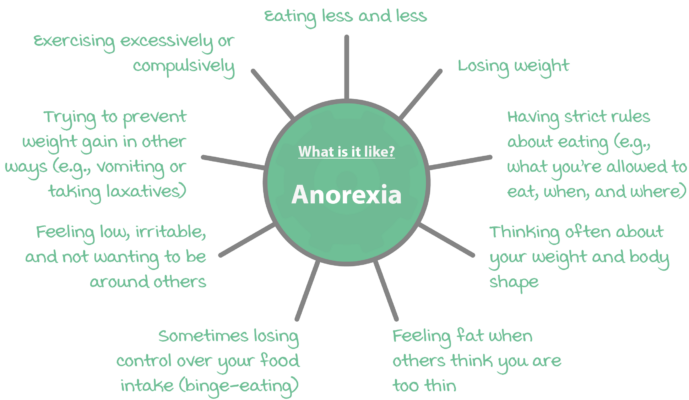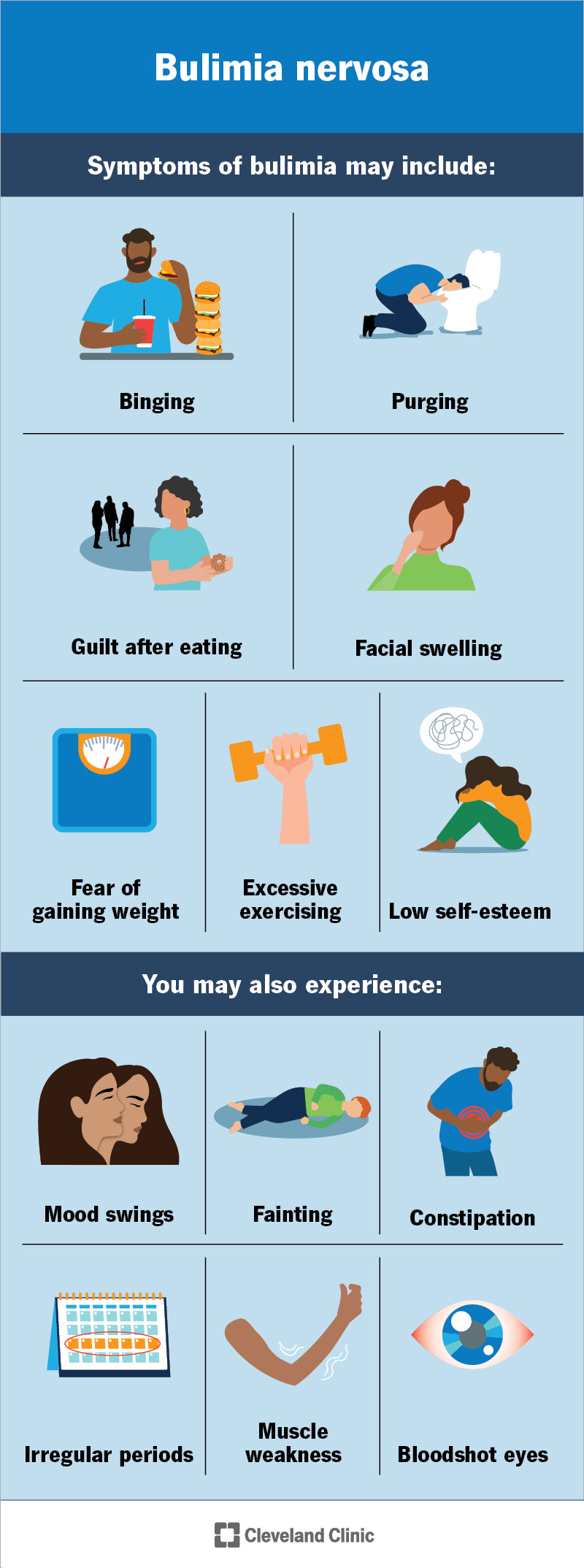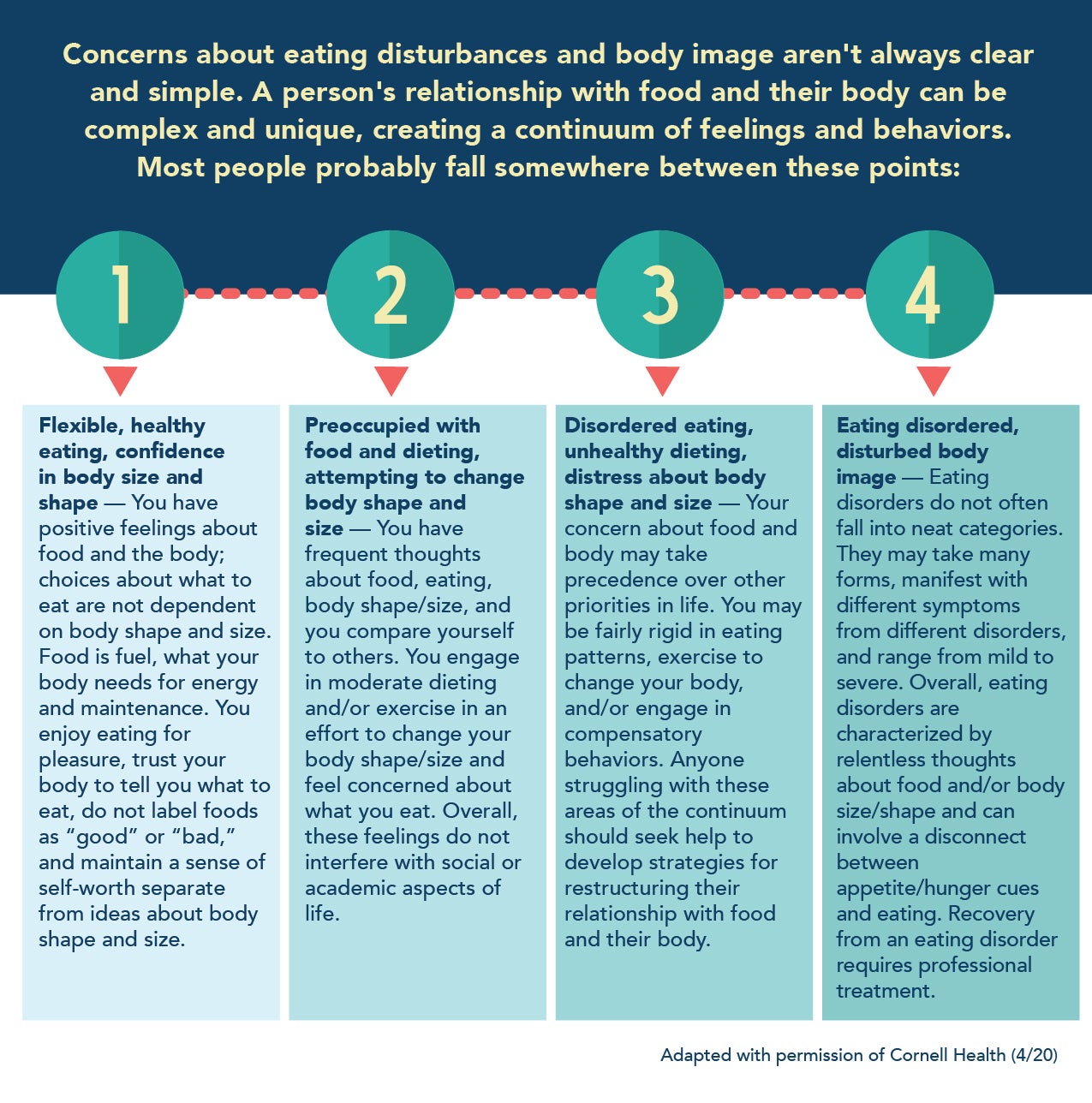The Ultimate Guide To Eating Disorder Recovery
Wiki Article
The smart Trick of Eating Disorder Recovery That Nobody is Discussing
Table of ContentsExamine This Report on Eating Disorder RecoverySome Known Details About Eating Disorder Recovery The Facts About Eating Disorder Recovery RevealedThe Single Strategy To Use For Eating Disorder RecoveryThe Facts About Eating Disorder Recovery Uncovered

Orthorexia is a kind of consuming problem, still unrecognized in the DSM, where an individual comes to be stressed with "healthy eating." While many individuals emphasize to be familiar with the components and also sourcing of their food, orthorexia can end up being destructive to the person's wellness. Orthorexia creates people to determine certain food or food teams as "correct," "healthy and balanced," or "pure." At some point, particular foods or whole groups are removed from the individual's diet regimen; they might additionally start to consume over the ingredients in their foods, spending hours every day preparation dishes (eating disorder recovery).
Food active ingredients may likewise come to be the individual's just topic of conversation. Health and wellness repercussions may consist of a variety of gastrointestinal as well as dietary discrepancies. It can likewise cause a number of the exact same health and wellness risks as anorexia nervosa, as the individual's caloric consumption might be seriously limited. Orthorexia is additionally a typical co-occurring condition related to OCD.
3 Simple Techniques For Eating Disorder Recovery
With this problem, an individual will strictly avoid particular foods to the hinderance of their health and wellness - eating disorder recovery. Unlike orthorexia, nonetheless, the avoidance of certain foods isn't driven by notions of the food's healthfulness or pureness, but rather by a severe aversion to the food's taste, texture, or odor (although issues concerning spoilage or food poisoning might likewise exist).Over time, a growing number of foods end up being illogical, causing a very minimal combination of acceptable foods. Formerly called discerning eating disorder, ARFID commonly starts in childhood years and also progressively intensifies gradually. It's reasonably usual for kids to be "particular eaters" and every person has choices of what they eat, but if it becomes compulsive and destructive to an individual's health and wellness, it requires a check-in with an eating condition therapy specialist.
Like orthorexia, a negative or altered body photo is not always a cause of the disorder. ARFID is generally dealt with utilizing talk therapy and cognitive retraining such as Cognitive Behavior Modification (CBT). Unlike many eating problems which usually initially present during teenage years, rumination condition is most usual in early stage as well as early a knockout post childhood, although it can continue into adulthood.
Eating Disorder Recovery Can Be Fun For Everyone
Normally, they do not experience stress or disgust when spewing, neither do they appear to make an initiative to vomit (as seen in bulimia nervosa). Rumination disorder is typically a reaction to an irrational worry of here disease triggered by consuming, although its causes are much less well-understood than various other eating problems.

Orthorexia is a form of consuming condition, still unacknowledged in the DSM, wherein a person ends up being stressed with "healthy eating." While lots of people emphasize to be familiar with the active ingredients as well as sourcing of their food, orthorexia can end up being destructive to the person's health and wellness. Orthorexia triggers individuals to determine particular food or food groups as "correct," "healthy and balanced," or "pure." Eventually, certain foods or entire groups are gotten rid of from the individual's diet plan; they may likewise begin to obsess over the active ingredients in their foods, spending hours daily preparation dishes.
The Best Strategy To Use For Eating Disorder Recovery

With this condition, a person will purely stay clear of specific foods to the hinderance of their wellness. Unlike orthorexia, however, the avoidance of particular foods isn't driven by ideas of the food's healthiness or pureness, yet rather by a serious hostility to the food's flavor, structure, or odor (although concerns concerning putridity or gastrointestinal disorder may additionally be existing).
Over time, an increasing number of foods end up being untenable, bring about an extremely minimal combination of appropriate foods. Formerly called careful eating condition, ARFID frequently begins in childhood years and considerably her response aggravates gradually. It's fairly typical for youngsters to be "picky eaters" and also every person has choices for what they consume, but if it ends up being uncontrollable and detrimental to a person's health and wellness, it calls for a check-in with an eating disorder treatment expert.
The Ultimate Guide To Eating Disorder Recovery
Likewise like orthorexia, a negative or distorted body picture is not always a reason for the problem. ARFID is generally treated using talk therapy and also cognitive re-training such as Cognitive Behavior Modification (CBT). Unlike a lot of eating conditions which normally initially existing throughout teenage years, rumination condition is most common in early stage as well as early youth, although it can persist right into their adult years.Usually, they do not experience stress or disgust when throwing up, neither do they show up to make an initiative to vomit (as seen in bulimia nervosa). Rumination condition is frequently a reaction to an unreasonable anxiety of health problem triggered by eating, although its reasons are much less well-understood than various other eating problems.
Rumination condition is listed in the DSM-V. One of one of the most unsafe forms of eating disorder, ED-DMT1 (colloquially called diabulimia), takes place when a person with type-1 diabetic issues purposefully skips their insulin dosage to slim down. Diabulimia is provided as one of the numerous undefined eating problems under the catchall term OSFED (Other Specified Feeding r Consuming Problem).
Report this wiki page